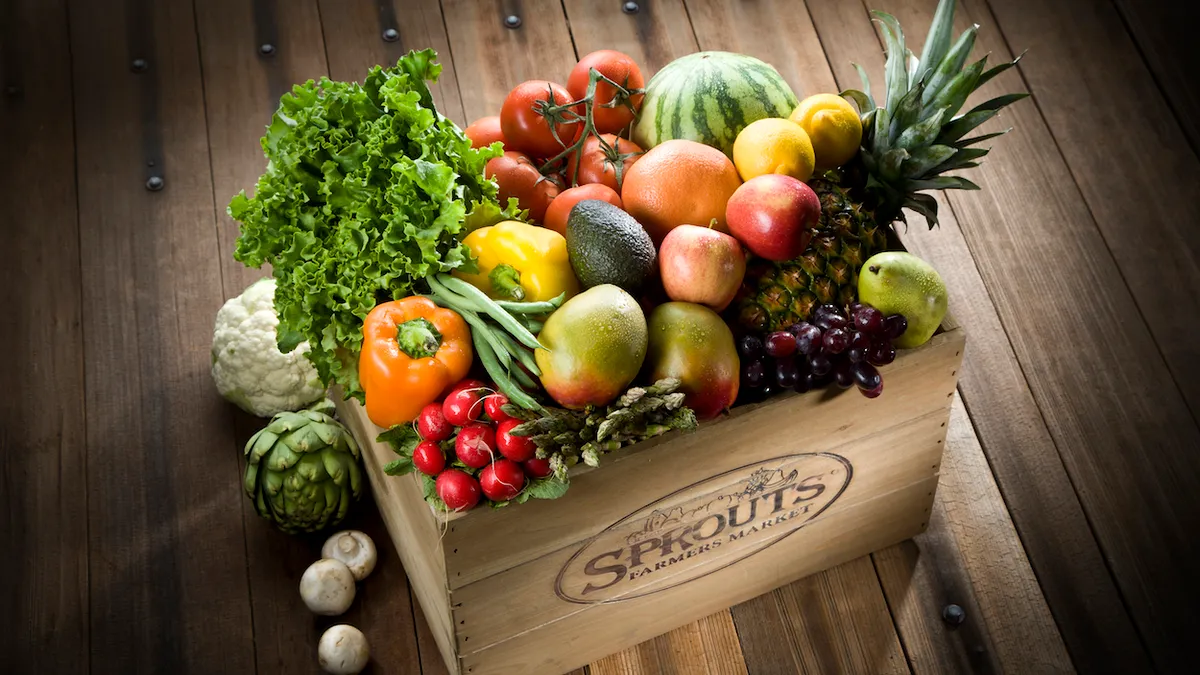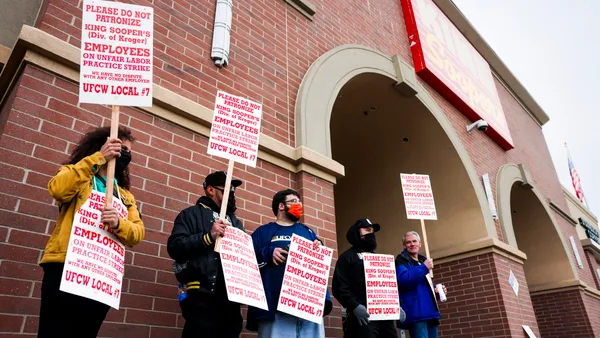Dive Brief:
- Sprouts Farmers Market will slow its store growth next year as the company adjusts its marketing and operational strategies, CEO Jack Sinclair said on the company’s third-quarter earnings call Wednesday. The specialty retailer plans to open 20 stores in 2020 compared to 28 this year, as well as resume or possibly even accelerate its pace of around 30 store openings per year in 2021, Sinclair said.
- Long-term, Sinclair expects Sprouts to build smaller stores — a reflection of rising building costs and the fact that Sprouts’ crop of smaller stores are more productive than its larger ones. The chief executive said the company will assess how to build a more scaled-down prototype over the next year or so.
- Sprouts beat analysts’ expectations for Q3, with net sales up 8% to $1.4 billion and comps up 1.5%. Net income was down 32% to $26 million, driven in part by a new lease accounting standard. Sprouts raised its guidance for 2019 to a range of $1.10 to $1.13 per share.
Dive Insight:
Jack Sinclair hinted at changes Sprouts needed to make during last quarter’s earnings. More than a hundred days into the job, the chief executive gave a more detailed rundown of what the company needs to be doing better.
First, Sprouts needs to update its new-store strategy. This includes building slightly smaller, more cost-effective locations that are better synched up with distribution and better reflect the chain's farmer's market image. Its new stores have grown progressively larger as the chain adds new products and services like enhanced delis. While the company doesn’t yet know all the details, Sinclair said Sprouts can build scaled-down, more efficient locations that still maintain all the products and services customers enjoy. The chain’s enhanced deli, for one, is a hit with customers — but it’s too big, Sinclair said.
Sprouts' pace of roughly 30 store openings per year has strained its supply capabilities, and Sinclair said it will slow down its opening pace in 2020 to get expansion and distribution better in sync. Next year’s store openings will be locations already underway and those in “premier locations.”
“Behind the scenes, how do we create an infrastructure to be more effective at managing our inventory, to be more effective at managing our distribution flow and to be more effective at making life a little bit easier for our stores?” Sinclair said.
When Sprouts does resume expansion, it will look to build up density in top markets. The chain is known for spacing locations far apart while relying on delivery to broaden its reach. But Sinclair said some locations are positioned too far away from distribution centers and local suppliers, creating supply chain inefficiencies. He said Sprouts can build out stores in key geographies in ways that boost customer awareness without cannibalizing sales.
The former Walmart grocery head sees other ways to reach customers, boost efficiencies and streamline the business. The chain’s marketing, he said, is too reliant on print media. Sprouts sends out roughly 21 million newspaper flyers a week, which can be trimmed back, with more dollars going toward targeted digital ads. It’s also too aggressive on promotions, slashing prices in highly differentiated categories like frozen where it can justify more of a premium.
“When I walk up and down our frozen cabinets, we’ve got a very different offer to what I would find in a traditional grocery store,” Sinclair said. “And that allows us, I think, to get the kind of pricing that reflects what the customer sees as value.
Sprouts has expanded its private label selection considerably in recent years, but Sinclair said there are too many sub-brands being offered, and the company plans to unite them under a single brand.
“We plan to build a cohesive private label brand streamlining and improving our communication to customers that maximize the Sprouts position as the affordable, healthy living grocer,” he noted.
Overall, Sinclair expressed a need for Sprouts to improve the way it markets its brand identity to customers.
“The Sprouts brand is differentiated and has real salience for both existing and potential customers, but we are not telling the brand story to the best of our ability.”
While Sinclair was able to map out several short-term fixes, the company’s long-term strategy remains to be determined. Sinclair said Sprouts will enlist external support to help chart its multiyear strategy, but declined to say who would provide that support and in what capacity.
Amid all the discussion of change, Sinclair said there are numerous strengths Sprouts will look to build upon. E-commerce continues to grow, with home delivery sales up 200% over last quarter. Sprouts has also begun offering store pickup, but Sinclair said home delivery is much more popular with shoppers, with sales on average six times higher than click and collect.













